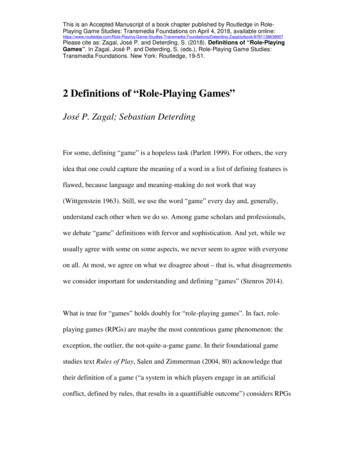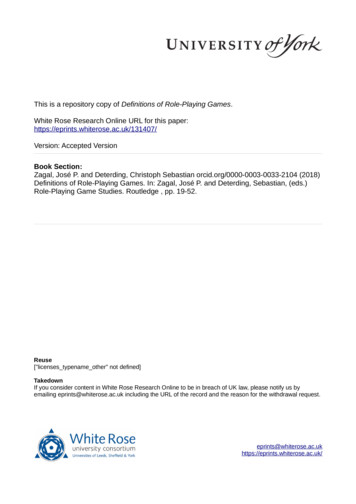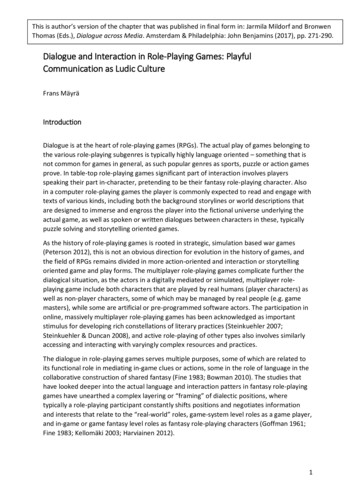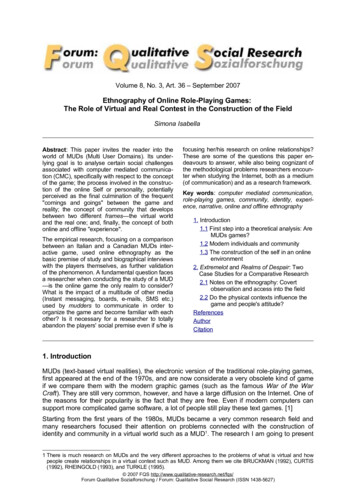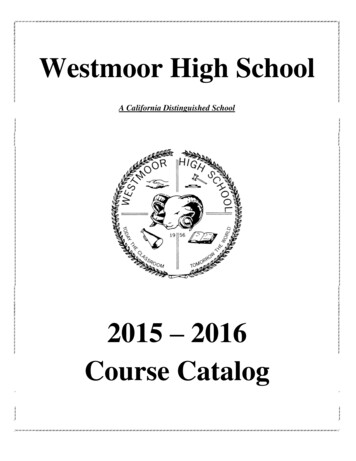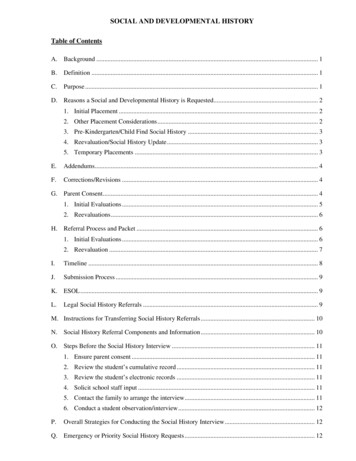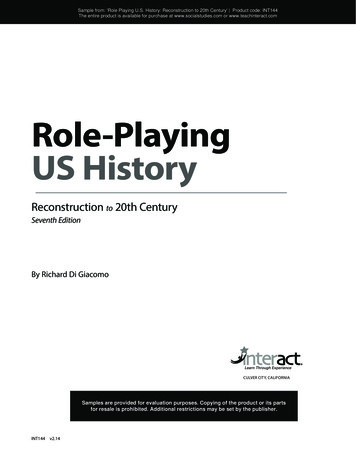
Transcription
Sampleto 20thSample from:from: 'Role'Role PlayingPlaying U.S.U.S. History:History: ReconstructionReconstruction to20th Century'Century' ProductProduct code:code: INT144INT144The entireentire productproduct isis availableavailable forfor purchasepurchase atat www.socialstudies.comwww.socialstudies.com oror PlayingUS HistoryReconstruction to 20th CenturySeventh EditionBy Richard Di GiacomoCULVER CITY, CALIFORNIASamplesSamples areare providedprovided forfor evaluationevaluation purposes.purposes. CopyingCopying ofof thethe productproduct oror itsits partspartsforfor resaleresale isis prohibited.prohibited. AdditionalAdditional restrictionsrestrictions maymay bebe setset byby thethe publisher.publisher.INT144v2.14
Sampleto 20thSample from:from: 'Role'Role PlayingPlaying U.S.U.S. History:History: ReconstructionReconstruction to20th Century'Century' ProductProduct code:code: INT144INT144The entireentire productproduct isis availableavailable forfor purchasepurchase atat www.socialstudies.comwww.socialstudies.com oror me toRole-Playing US HistoryThis book is an exciting collection of role-playingsimulations for Social Studies classrooms.Eleven open-ended simulations involve studentsin reenacting certain world-changing events fromReconstruction to the twentieth century.Students are actively engaged in assuming the rolesof decision makers at crucial junctures in history,using critical thinking and group decision-making skillsto resolve conflicts. Although most of the simulationsare written for US History, some of them wouldwork equally well in other social studies classes.All of these simulations will work in classes rangingfrom junior high to high school and at ability levelsranging from sheltered classes to honors.
Sampleto 20thSample from:from: 'Role'Role PlayingPlaying U.S.U.S. History:History: ReconstructionReconstruction to20th Century'Century' ProductProduct code:code: INT144INT144The entireentire productproduct isis availableavailable forfor purchasepurchase atat www.socialstudies.comwww.socialstudies.com oror ntsNational Curriculum Standards for Social Studies . . . . . . . . . . . . . viiiCommon Core Standards . . . . . . . . . . . . . . . . . . . . . . . . . . . . . . . . . . . . . . . . . . ixIntroduction . . . . . . . . . . . . . . . . . . . . . . . . . . . . . . . . . . . . . . . . . . . . . . . . . . . . . . . . 1FAQ’s . . . . . . . . . . . . . . . . . . . . . . . . . . . . . . . . . . . . . . . . . . . . . . . . . . . . . . . . . . . . . . . . . 4Simulation Lesson PlanReconstruction . . . . . . . . . . . . . . . . . . . . . . . . . . . . . . . . . . . . . . . . . . . . . . . . 7Taking Colonies . . . . . . . . . . . . . . . . . . . . . . . . . . . . . . . . . . . . . . . . . . . . . . . 10Great Powers Game . . . . . . . . . . . . . . . . . . . . . . . . . . . . . . . . . . . . . . . . . . 11STRIKE! . . . . . . . . . . . . . . . . . . . . . . . . . . . . . . . . . . . . . . . . . . . . . . . . . . . . . . . . 15Dust Bowl . . . . . . . . . . . . . . . . . . . . . . . . . . . . . . . . . . . . . . . . . . . . . . . . . . . . . 19World War II Debates . . . . . . . . . . . . . . . . . . . . . . . . . . . . . . . . . . . . . . . . . 22Cold War . . . . . . . . . . . . . . . . . . . . . . . . . . . . . . . . . . . . . . . . . . . . . . . . . . . . . . 24Cuban Missile Crisis . . . . . . . . . . . . . . . . . . . . . . . . . . . . . . . . . . . . . . . . . . . 29Hippie Day . . . . . . . . . . . . . . . . . . . . . . . . . . . . . . . . . . . . . . . . . . . . . . . . . . . . 33Vietnam Peace Talks . . . . . . . . . . . . . . . . . . . . . . . . . . . . . . . . . . . . . . . . . . 35Twentieth Century Slang . . . . . . . . . . . . . . . . . . . . . . . . . . . . . . . . . . . . . 38US History Counterfactuals: “What if . . . ?” . . . . . . . . . . . . . . . . . . . 40ReproduciblesReconstruction Simulation . . . . . . . . . . . . . . . . . . . . . . . . . . . . . . . . . . . . . 57Group A: Radical Republicans . . . . . . . . . . . . . . . . . . . . . . . . . . . . . . . . 59Group B: Defeated Southern Leaders . . . . . . . . . . . . . . . . . . . . . . . . 60Group C: Freedmen . . . . . . . . . . . . . . . . . . . . . . . . . . . . . . . . . . . . . . . . . . . 61Group D: Moderate Republicans . . . . . . . . . . . . . . . . . . . . . . . . . . . . . 62 2015 - www.teachinteract.comRole-Playing Simulations v
ContentsSampleto 20thSample from:from: 'Role'Role PlayingPlaying U.S.U.S. History:History: ReconstructionReconstruction to20th Century'Century' ProductProduct code:code: INT144INT144The entireentire productproduct isis availableavailable forfor purchasepurchase atat www.socialstudies.comwww.socialstudies.com oror g Colonies: A US History Writing Assignment . . . . . . . . . . 63Great Powers Game . . . . . . . . . . . . . . . . . . . . . . . . . . . . . . . . . . . . . . . . . . . . . 64Great Powers Game Sample Turn . . . . . . . . . . . . . . . . . . . . . . . . . . . . 66Country Description Sheet #1: Great Britain . . . . . . . . . . . . . . . . . 67Country Description Sheet #2: France . . . . . . . . . . . . . . . . . . . . . . . . 68Country Description Sheet #3: Germany . . . . . . . . . . . . . . . . . . . . . 69Country Description Sheet #4: Italy . . . . . . . . . . . . . . . . . . . . . . . . . . 70Country Description Sheet #5: Austro-Hungarian Empire . . . 71Country Description Sheet #6: Russia . . . . . . . . . . . . . . . . . . . . . . . . 72Country Description Sheet #7: Ottoman Empire . . . . . . . . . . . . . 73Country Description Sheet #8: United States of America . . . . 74Country Description Sheet #9: Japan . . . . . . . . . . . . . . . . . . . . . . . . 75Great Powers Game Tokens . . . . . . . . . . . . . . . . . . . . . . . . . . . . . . . . . . 76Great Powers World Map . . . . . . . . . . . . . . . . . . . . . . . . . . . . . . . . . . . . . 88Great Powers Game Turn Record Sheet . . . . . . . . . . . . . . . . . . . . . . 89STRIKE! Simulation. . . . . . . . . . . . . . . . . . . . . . . . . . . . . . . . . . . . . . . . . . . . . . 90Employer’s Needs . . . . . . . . . . . . . . . . . . . . . . . . . . . . . . . . . . . . . . . . . . . . . 91Workers’ Needs . . . . . . . . . . . . . . . . . . . . . . . . . . . . . . . . . . . . . . . . . . . . . . . 93Special Characters . . . . . . . . . . . . . . . . . . . . . . . . . . . . . . . . . . . . . . . . . . . . 95Dust Bowl Simulation. . . . . . . . . . . . . . . . . . . . . . . . . . . . . . . . . . . . . . . . . . . 96Dust Bowl Oral History #1: Head for the West Coast . . . . . . . . . 97Dust Bowl Oral History #2: Join the Army . . . . . . . . . . . . . . . . . . . . 98Dust Bowl Oral History #3: Stick It Out at Home . . . . . . . . . . . . . 99Dust Bowl Oral History #4: Head for the Rural Southeast . . 100Dust Bowl Oral History #5: Heading for the Big City . . . . . . . . 101Dust Bowl Oral History #6: Heading North to Canada . . . . . . 102vi Role-Playing Simulations 2015 - www.teachinteract.com
Sampleto 20thSample from:from: 'Role'Role PlayingPlaying U.S.U.S. History:History: ReconstructionReconstruction to20th Century'Century' ProductProduct code:code: INT144INT144The entireentire productproduct isis availableavailable forfor purchasepurchase atat www.socialstudies.comwww.socialstudies.com oror ntsWorld War II Debates . . . . . . . . . . . . . . . . . . . . . . . . . . . . . . . . . . . . . . . . . . 103Cold War Simulation . . . . . . . . . . . . . . . . . . . . . . . . . . . . . . . . . . . . . . . . . . . 105Cold War Sample Turn . . . . . . . . . . . . . . . . . . . . . . . . . . . . . . . . . . . . . . . 108Roles on a Team . . . . . . . . . . . . . . . . . . . . . . . . . . . . . . . . . . . . . . . . . . . . . 110Cold War Random Events Table . . . . . . . . . . . . . . . . . . . . . . . . . . . . . 111Cold War Playing Cards . . . . . . . . . . . . . . . . . . . . . . . . . . . . . . . . . . . . . . 112Country Points . . . . . . . . . . . . . . . . . . . . . . . . . . . . . . . . . . . . . . . . . . . . . . . 118Cuban Missile Crisis Simulation. . . . . . . . . . . . . . . . . . . . . . . . . . . . . . . 120Country Description #1: The Soviets . . . . . . . . . . . . . . . . . . . . . . . . 121Country Description #2: The Americans . . . . . . . . . . . . . . . . . . . . 123Country Description #3: The Cubans . . . . . . . . . . . . . . . . . . . . . . . . 125Cuban Missile Crisis Tokens . . . . . . . . . . . . . . . . . . . . . . . . . . . . . . . . . . 126Vietnam Peace Talks Simulation . . . . . . . . . . . . . . . . . . . . . . . . . . . . . . 129Vietnam Peace Talks Sample Turn . . . . . . . . . . . . . . . . . . . . . . . . . . . 131Vietnam Peace Talks Random Events Chart . . . . . . . . . . . . . . . . . 132Vietnam Peace Talk Playing Cards . . . . . . . . . . . . . . . . . . . . . . . . . . . 133Vietnam Peace Talks Turn Record Sheet . . . . . . . . . . . . . . . . . . . . 142Twentieth Century Slang . . . . . . . . . . . . . . . . . . . . . . . . . . . . . . . . . . . . . . 143Twentieth Century Slang Answer Sheet . . . . . . . . . . . . . . . . . . . . 144Teacher Feedback Form. . . . . . . . . . . . . . . . . . . . . . . . . . . . . . . . . . . . . . . . . . 147Release Form for Photographic Images . . . . . . . . . . . . . . . . . . . . . . . . 148 2015 - www.teachinteract.comRole-Playing Simulations vii
Sampleto 20thSample from:from: 'Role'Role PlayingPlaying U.S.U.S. History:History: ReconstructionReconstruction to20th Century'Century' ProductProduct code:code: INT144INT144The entireentire productproduct isis availableavailable forfor purchasepurchase atat www.socialstudies.comwww.socialstudies.com oror ductionWhat is a role-playing simulation?Role-playing simulations attempt to put the student in the position of aperson in a particular time and place. All of the simulations involve groupproblem solving and conflict resolution. The students are given a charactersheet (which describes the group’s needs and desires), a brief description ofthe historical problem, and a copy of the rules of the game. Familiarity withfantasy role-playing games is a plus, but certainly not required. The individualassumes the role chosen and makes decisions as the character would makeduring that particular time period. No pre-set limits are placed on a particularperson’s choices as long as they are within the realm of what was historicallypossible. Because of the freedom to choose in these games, the outcome isvery unpredictable. No two classes finish the simulation in the exact same way,which leads to some very interesting classroom discussions about why thingsturned out the way they did, what could have happened differently, and howthe simulation compares to what actually occurred in history.How are these activities different from other simulations?Unlike many simulations that are commercially available, these games canusually be played in one or two class periods. Their open-ended nature allowsfor playing up to one week if time permits, but after a couple of days youwill find that most of the possibilities have been exhausted, and continuedplay will have only limited instructional value. Another key advantage to thissystem is the cost. Everything you need to play these simulations can bereproduced out of this book. There are no tiresome charts to deal with, andminimal setup and cleanup time is required, allowing for maximum roleplaying time. As much as possible, pieces have been kept to a minimum tomake cleanup and storage easier and to keep costs down for teachers on abudget. The emphasis is on role-playing so that students can get as much aspossible out of their personal learning experience and not get tied up in themechanics of a complicated rules system.How are the simulations used?The best way to use these simulations is at the beginning of a unit whenstudents have little prior knowledge of the historical outcome of a particularconflict. This allows a clean slate for actions instead of a predictable imitationof history just because “That’s the way it had to be.” When the teacher doesbegin the regular instructional part of the unit, the students will automaticallymake comments like, “Wow! That is just like what happened in the game,” or“Now I understand why they did what they did.” We all know that studentsremember better what they do rather than what they hear or read about, sothese simulations allow for an unforgettable experience that will bring historyalive for them. 2015 - www.teachinteract.comRole-Playing Simulations 1
HandoutSampleto 20thSample from:from: 'Role'Role PlayingPlaying U.S.U.S. History:History: ReconstructionReconstruction to20th Century'Century' ProductProduct code:code: INT144INT144The entireentire productproduct isis availableavailable forfor purchasepurchase atat www.socialstudies.comwww.socialstudies.com oror struction SimulationOverall goal To reconstruct the nation, which has been torn apart by the Civil WarPermission granted to reproduce for classroom use only. 2015 Interact. (800) 421-4246. www.teachinteract.comThe groups that we will represent areA. Radical Republicans: The victorious Northerners of the Republican Party who wantto make radical reforms to punish the South and guarantee the rights of the newlyfreed slavesB. Defeated Southern Leaders: The war has been lost, and the North has freed the slaves.The South must decide whether to heal old wounds or fight for what was lost.C. Freedmen: Former slaves who now must find work and find their place in politics, theeconomy, and societyD. Moderate Republicans: Leaders like President Lincoln and Vice President Johnson whowish to take it easy on the South so that they will peacefully rejoin the Union without toomuch resentmentHow the game is playedForm groups of from 2–8 members. Read the overall goals for your group. Then begin reading the individual problems that your group must face. Discuss solutions to these problems openly. Record yourresponses on a separate sheet of paper. If members of your group disagree upon a particular solutionrecord both responses and indicate that some will do one thing and some will do another. You arerepresenting a whole class of society, so not everyone will respond to challenges in the same way.Please keep in mind that you must be as specific as possible in your proposed solutions. For example, it is not enough just to say, “We will create schools to educate freed blacks.” Which level ofgovernment will do this, local, state or, federal? Who will pay for it? Keep in mind the time periodthat you are dealing with. There are no income taxes; the federal government is relatively small andnot used to dealing directly with social problems. There are no civil rights laws dealing with race orgender. Only white males with property can vote, for example. There are no government agenciesthat give financial aid to minorities of any kind.Most importantly, try to think as people would have thought in the late 1860s. Don’t insert your ownmodern ideas of what is right. Be faithful to the role you are playing even if you disagree with theviews of the group you are representing. 2015 - www.teachinteract.comRole-Playing Simulations 57
SampleSample from:from: 'Role'Role PlayingPlaying U.S.U.S. History:History: ReconstructionReconstruction toto 20th20th Century'Century' ProductProduct code:code: INT144INT144The entireentire productproduct isis availableavailable forpurchase atat www.socialstudies.comwww.socialstudies.com oror www.teachinteract.comwww.teachinteract.comThefor purchaseReconstruc tion Simulation(page 2)HandoutGroup rolesEach group will need at least one of the following. Small groups may cover more than one role:B. Recorder: Writes down the final responses to the questions; clearly labels which questionis being addressed and checks for completeness, spelling, and grammar errors.C. Compromiser: Tries to come to an agreement with which everyone can liveFrederick DouglassImage source: Public domain, via Wikimedia Commons58 Role-Playing Simulations 2015 - www.teachinteract.comPermission granted to reproduce for classroom use only. 2015 Interact. (800) 421-4246. www.teachinteract.comA. Facilitator: Leads the discussion and makes sure everyone has a chance to participate
HandoutSampleSample from:from: 'Role'Role PlayingPlaying U.S.U.S. History:History: ReconstructionReconstruction toto 20th20th Century'Century' ProductProduct code:code: INT144INT144The entireentire productproduct isis availableavailable forpurchase atat www.socialstudies.comwww.socialstudies.com oror www.teachinteract.comwww.teachinteract.comThefor purchaseReconstruc tion SimulationPermission granted to reproduce for classroom use only. 2015 Interact. (800) 421-4246. www.teachinteract.comGroup A: Radical RepublicansYou have won the war and are proud of it. You intend to have the Republican Party take credit forsaving the Union and never let anybody forget it. You are not beyond waving a bloody shirt during political speeches to remind people what the Confederacy did to this country. You believe inseverely punishing the South for breaking away from the Union and starting the war. You are gladthat the question of whether the federal government should be more powerful than the states hasbeen settled once and for all in favor of the federal government. You are anxious to use that newpower to show the defeated Southern states who is boss. You feel that if the South is treated toolightly they might rise up in rebellion again, and one civil war was enough. You are beginning to losepatience with the president for being too soft on the South and not moving quickly enough to helpfree blacks obtain their political and economic rights. Here are the problems you must discuss andsolve together:1. How will you treat the leaders of the old Confederate government? Some of them would liketo run for office and rejoin your government.2. How will you deal with the Confederate prisoners of war? How and when will you releasethem? Should they be punished for fighting against the United States? The usual punishmentfor treason is the death penalty. Does everyone get this, officers and enlisted men alike?3. What do you do with the occupied areas of the South? What rules do you make for states thatwant to rejoin the Union? How do people get back their citizenship in the Union?4. How will you guarantee the rights of free blacks? Many Southerners are still very prejudicedagainst blacks and do not want to give them their rights. They want to bring back the old wayof life before slaverywas abolished. How doyou educate the blacksand teach them jobskills? Most of them onlyknew farming beforethey got their freedom,but how can they farmif they don’t own land?You would like to haveblacks vote and participate in governmentlike other men, but howcan they vote and runfor office if most can’tread and don’t have anypolitical experience?“The Rail Splitter Repairing the Union,” 1865Image source: By Joseph E. Baker, Public domain, via Wikimedia Commons 2015 - www.teachinteract.comRole-Playing Simulations 59
Role-playing simulations attempt to put the student in the position of a person in a particular time and place. All of the simulations involve group . the historical problem, and a copy of the rules of the game. Familiarity with fantasy role-playing games is a plus, but certainly not required. The individual assumes the role chosen and makes .



